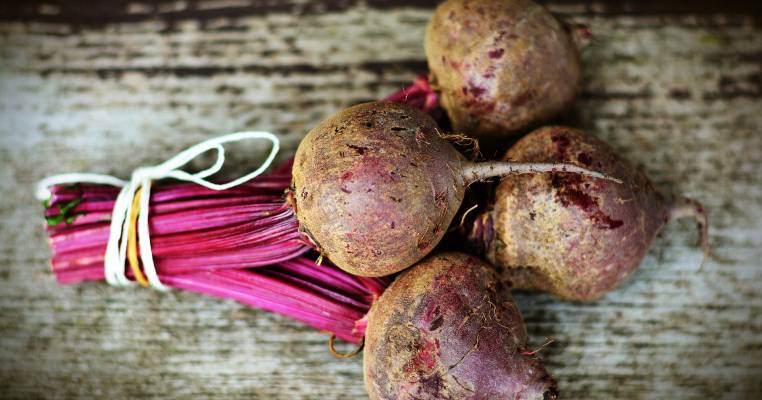 While scientific interest in beetroot has only gained momentum in the past few decades, reports of its use as a natural medicine date back to Roman times (1).
While scientific interest in beetroot has only gained momentum in the past few decades, reports of its use as a natural medicine date back to Roman times (1).
Beets are an ancient and prehistoric food that grew wild along the coastlines of North Africa, Asia, and Europe and was part of the human diet. Our prehistoric ancestors consumed the green part of the beets, in fact the sweet beet “root” we eat today and consider “beet” was only first cultivated in the era of ancient Rome. Then, in the 19th century beets began to be used for the production of sugar and still are today (these beets are unfortunately often genetically modified) (2).
The refining process, which the beets undergo for the production of sugar, strips the end product of all the amazing properties and unique health-boosting nutrients that may not be present in other foods; that’s why you want to include the whole form of this amazing vegetable in your diet!
Benefits of beets and why you should include them in your diet.
Even though beets should be used sparingly due to their high carbohydrate and sugar content levels (beets have the highest sugar content of all vegetables), most people can include beet roots safely in their weekly diet and can consume the greens with no limitations benefitting from the following advantages offered by this powerhouse nutrient vegetable
1. Beets help to fight Inflammation
Beets are a unique source of betaine, a nutrient that helps protect cells, proteins, and en-zymes from environmental stress. It's also known to help fight inflammation, protect internal organs, improve vascular risk factors, enhance performance, and likely help prevent nu-merous chronic diseases. As reported by the World's Healthiest Foods: "[Betaine's]… presence in our diet has been associated with lower levels of several inflam-matory markers, including C reactive protein, interleukin-6, and tumor necrosis factor alpha. As a group, the anti-inflammatory molecules found in beets may eventually be shown to provide cardiovascular benefits in large-scale human studies, as well as anti-inflammatory benefits for other body systems."(2)
2. Beets promote oxygen delivery and lower blood pressure
Beets are rich in nitrates that our body converts into nitric oxide (3), a molecule that is es-sential to the delivery and utilisation of oxygen in the bloodstream. Once converted, nitric oxide works to help blood vessels dilate, improving circulation and lowering blood pressure as a direct consequence. In a study (4) published in Nutrition, men and women who drank 17.6 ounces of beet juice, which consisted of about three-fourths beet juice and one-fourth apple juice, had a lower systolic blood pressure six hours later. However, when research-ers limited their analysis to men, they found a significant reduction of about 4.7 points among those who drank beetroot juice versus the placebo.
3. Beets improve sexual health
Because of the high nitrate content, Beets have been named “Nature’s Viagra”, in fact, like Viagra, beets’ nitrate content promotes nitric oxide formation (5) (as explained above) which dilates blood vessels improving circulation in the penis.
4. Beets boost your strength and stamina
Nitrate rich-foods, acting upon the circulatory system, increase exercise endurance. (6) Researches (6) have found a 16% increase in length of exercise time of those who drunk beet juice before a work out. The reason for this, researchers believe, may lay again in the nitrate contents of beets and the nitric oxide’s action on the circulatory system which re-duces the oxygen cost of low-intensity exercise enhancing the stamina for high-intensity exercise at the same time. (6)
5. Beets support DNA maintenance and blood cell production
A number of studies report that beetroot, in the form of a juice supplement, protects against oxidative damage to DNA (7). Beets contain a high amount of folate, a vitamin that plays an essential role in the produc-tion of DNA and RNA, and in maintaining healthy neurological function. Several studies have suggested that folate can reduce the risk of depression, dementia, and age-related neurological degeneration. (8) The folate provided by beetroot works also with Vitamins B12 and B6 in the production of red blood cells and the use of iron, both of which are necessary for the transport of oxygen to working muscles and organs. When our bodies fail to create and use iron efficiently, we become easily fatigued and may become anaemic.
6. Beets help in fighting oxidative stress
Beetroot is as an exceptionally rich source of antioxidant compounds that help to strength-en the body’s own antioxidant defences, helping to protect cellular components from oxi-dative damage. The betalain pigments in particular, have been shown by several in vitro studies to protect cellular components from oxidative injury. (9)
Lorem ipsum dolor sit amet, consectetur adipiscing elit, sed do eiusmod tempor incididunt ut labore et dolore magna aliqua. Ut enim ad minim veniam, quis nostrud exercitation ullamco laboris nisi ut aliquip ex ea commodo consequat. Duis aute irure dolor in reprehenderit in voluptate velit esse cillum dolore eu fugiat nulla pariatur. Excepteur sint occaecat cupidatat non proident, sunt in culpa qui officia deserunt mollit anim id est laborum.
How to incorporate beets in your weekly diet
- Add a small piece of beet root in your vegetable juices every morning.
- If you ferment your vegetables, add shredded beetroot in the mix and eat a small portion as a side to each meal
- Lightly steamed.
- Roasted beets
- Experiment and be creative!
Sources:
(1) Nutritional and functional potential of Beta vulgaris cicla and rubra. Ninfali P, Angelino D Fitoterapia. 2013 Sep; 89():188-99.
(2) https://articles.mercola.com/sites/articles/archive/2014/01/25/beets-health-benefits.aspx
(3) https://www.webmd.com/food-recipes/features/truth-about-beetroot-juice
(4) https://nutritionj.biomedcentral.com/articles/10.1186/1475-2891-11-106
(5) https://www.healthline.com/health/erectile-dysfunction/beet-juice-for-ed
(6) https://www.ncbi.nlm.nih.gov/pubmed/19661447
(7) https://www.ncbi.nlm.nih.gov/pmc/articles/PMC4425174/
(8) https://www.ncbi.nlm.nih.gov/pmc/articles/PMC3428233/
(9) https://www.ncbi.nlm.nih.gov/pmc/articles/PMC4425174/
https://www.medicaldaily.com/7-beets-benefits-your-health-losing-weight-better-sex-420462




 Follow me on facebook
Follow me on facebook